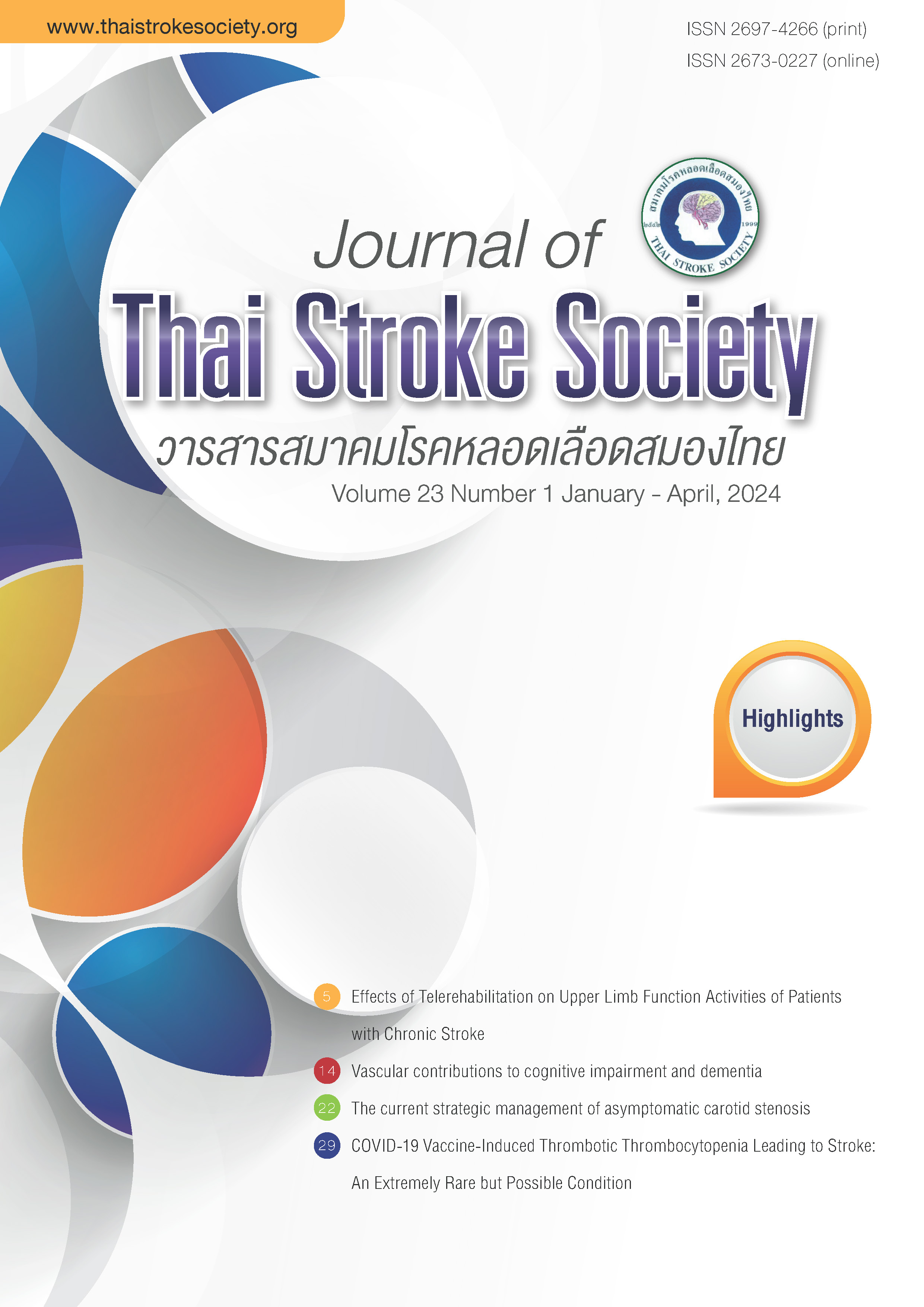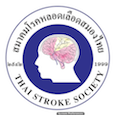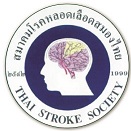The current strategic management of asymptomatic carotid stenosis
Keywords:
Asymptomatic carotid stenosis, Carotid endarterectomy, Carotid stent, Unstable plaque, High risks plaqueAbstract
Asymptomatic carotid stenosis has been enormously debated, especially in the aspect of ischemic neurological prevention. The better efficacy of antiplatelets and lipid lowering agents may be enough for prevention of stroke. Patient with high risk plaque have the greater risk of stroke than usual. The characters of high risk plaque such as rapidly progressive stenosis, larger plaque area, large lipid core, thin fibrous cap and the evidence of distal embolization should be elucidated in all patient with carotid stenosis
Carotid endarterectomy (CEA) or carotid stenting (CAS) are currently suitable treatment in asymptomatic carotid stenosis of >60-70%. Although, the CEA had the lower risk of perioperative complications, but the higher risk of postoperative myocardial infarction. Therefore, the CAS may be alternative treatment especially in the patient who had high risk of perioperative complication from CEA.
Despite of the many issues concerned for strategic planning of stroke prevention. Comprehensive discussion between physician and patient are also the crucial complementary strategy for stroke prevention therapy.
References
Hadar N, Raman G, Moorthy D, et al. Asymptomatic Carotid Artery Stenosis Treated with Medical Therapy Alone. Temporal Trends and Implications for Risk Assessment and the Design of Future Studies. Cerebrovasc Dis. 2014;38:163-73.
Nicolaides A.N, Kakkos S.K, Griffin M, et al. Severity of Asymptomatic Carotid Stenosis and Risk of Ipsilateral Hemispheric Ischemic Events. Results from the ACSRS Study. Eur J Vasc Endovasc Surg. 2005;30:275-84.
Hirt L.S. Progression Rate and Ipsilateral Neurological Events in Asymptomatic Carotid Stenosis. Stroke. 2014;45:702-06.
Kakkos S.K, Nicolaides A.N, Charalambous I, et al. Predictors and clinical significance of progression or regression of asymptomatic carotid stenosis. the Asymptomatic Carotid Stenosis and Risk of Stroke (ACSRS) Study Group . J Vasc Surg. 2014;59:956-67.
Markus H.S, King A, Shipley M, et al. Asymptomatic embolization for prediction of stroke in the Asymptomatic Carotid Emboli Study (ACES). A prospective observational study. Lancet Neurol. 2010;9:663-71.
Topakian R, King A, Kwon S.U, et al. Ultrasonic plaque echolucency and embolic signals predict stroke in asymptomatic carotid stenosis. the ACES Investigators. Neurology. 2011;77:751-58.
Gupta A, Baradaran H, Schwieter A.D, et al. Carotid Plaque MRI and Stroke Risk A Systematic Review and Meta-analysis. Stroke. 2013;44:3071-77.
Kolos I, Troitskiy A, Balakhonova T, et al. Modern medical treatment with or without carotid endarterectomy for severe asymptomatic carotid atherosclerosis. The Aggressive Medical Treatment Evaluation for Asymptomatic Carotid Artery Stenosis (AMTEC) Study Group. J Vasc Surg. 2015;62:914-22.
Halliday A, Harrison M, Hayter E, et al. 10-year stroke prevention after successful carotid endarterectomy for asymptomatic stenosis (ACST-1). A multicenter randomized trial. Lancet. 2010;376:1074-84.
Naylor R et al., European Society for Vascular Surgery (ESVS) 2023 Clinical Practice Quidelines on the Management of Atherosclerotic Carotid and Vertebral Artery Disease, European Journal of Vascular and Endovascular Surgery, Available from: https://doi.org/10.1016/j.ejvs.2022.04.011
Halliday A, Bulbulia R, Bonati L.H, et al. Second asymptomatic carotid surgery trial (ACST-2). A randomised comparison of carotid artery stenting versus carotid endarterectomy. Lancet. 2021;398:1065-73.
Howard D.P.J, Gaziano L, Rothwell P.M, et al. Risk of stroke in relation to degree of asymptomatic carotid stenosis. A population-based cohort study, systematic review, and meta-analysis. Lancet Neurol. 2021;20:193-202.
Kakkos S.K, Sabetai M, Tegos T, et al. Silent embolic infarcts on computed tomography brain scans and risk of ipsilateral hemispheric events in patients with asymptomatic internal carotid artery stenosis. The Asymptomatic Carotid Stenosis and Risk of Stroke (ACSRS) Study Group. J Vasc Surg. 2009;49:902-9.
Anna K. Krawisz, MD, Kenneth Rosenfield, MD, Christopher J. White, MD, et al. Clinical Impact of Contralateral Carotid Occlusion in Patients Undergoing Carotid Artery Revascularization. J Am Coll Cardiol. 2021;77:835-44.
Smilde TJ, Wissen SV, Wollersheim H, et al. Effect of aggressive versus conventional lipid lowering on atherosclerosis progression in familial hypercholesterolaemia (ASAP). A prospective, randomised, double-blind trial. Lancet. 2001;357:577-81.
Crouse JR, Raichlen JS, Riley WA, et al. Effect of Rosuvastatin on Progression of Carotid Intima-Media Thickness in Low-Risk Individuals With Subclinical Atherosclerosis. The METEOR Trial. JAMA. 2007;297:1344-53.
Murphy SJX, Naylor AR, Ricco JB, et al. Optimal Antiplatelet Therapy in Moderate to Severe Asymptomatic and Symptomatic Carotid Stenosis. A Comprehensive Review of the Literature. Eur J Vasc Endovasc Surg. 2019:57:199e211
Jang-Hyun Baek, MD. Carotid Artery Stenting for Asymptomatic Carotid Stenosis. What We Need to Know for Treatment Decision. Neurointervention. 2023;18: 9-22.
Downloads
Published
How to Cite
Issue
Section
License
Copyright (c) 2024 Journal of Thai Stroke Society

This work is licensed under a Creative Commons Attribution-NonCommercial-NoDerivatives 4.0 International License.
ข้อความภายในบทความที่ตีพิมพ์ในวารสารสมาคมโรคหลอดเลือดสมองไทยเล่มนี้ ตลอดจนความรับผิดชอบด้านเนื้อหาและการตรวจร่างบทความเป็นของผู้นิพนธ์ ไม่เกี่ยวข้องกับกองบรรณาธิการแต่อย่างใด การนำเนื้อหา ข้อความหรือข้อคิดเห็นของบทความไปเผยแพร่ ต้องได้รับอนุญาตจากกองบรรณาธิการอย่างเป็นลายลักษณ์อักษร ผลงานที่ได้รับการตีพิมพ์ในวารสารเล่มนี้ถือเป็นลิขสิทธิ์ของวารสาร





